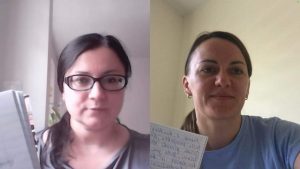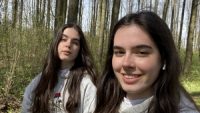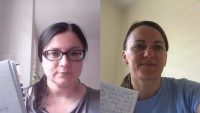VMU is Continuing and Expanding Its Support for Ukrainians

Since the start of war in Ukraine, Vytautas Magnus University has been actively involved in various support initiatives and activities for Ukrainians. The university offers possibilities to start or continue studies, provides support on accommodation or scholarships and free Lithuanian language courses for Ukrainians who have fled the war. Moreover, it has hosted a tandem language-learning event whose participants exchanged knowledge of Lithuanian and Ukrainian languages, while the VMU Education Academy has established the Ukrainian Centre, the first one of its kind in the world, where various cultural and educational activities are organised for the Ukrainian community.
Focus on Psychological and Physical Wellbeing
The Ukrainian Centre, which is dedicated to people who have suffered from the military operations in Ukraine, helps people get acclimated in Lithuania faster, establish new contacts and develop important skills. “The Ukrainian Centre, which was established in Vilnius in June, is hosting various activities: from sewing or beading workshops to psychological consultations or immersive theatre shows. The centre has already been visited by 2,000 Ukrainians aged 6 to 70. It has hosted almost 150 different events and 50 masterclasses, some of them held by Ukrainians. English and Lithuanian clubs have been established at the centre, as well as the Ukrainian Bookshelf, an international project dedicated to promotion of Ukrainian literature. The centre cooperates with a summer school for Ukrainian children; since the centre’s opening, the Order of Malta Relief Organisation in Lithuania has been organising free activities for Ukrainians. Ukrainian singer Jamala, the winner of the Eurovision Song Contest 2016, has also came to the centre to meet with her compatriots”, Algirdas Kumža, the head of the Ukrainian Centre, says.

Lithuanian Language and Culture Courses
Since the start of March, the Lithuanian Language and Culture Courses have been helping Ukrainians integrate in Lithuania; as of early August 2022, almost 700 Ukrainians have already registered to attend them. The courses are organised with generous help from the volunteers, almost 250 in total. 22 groups of participants were established in Kaunas, while 26 were created in Vilnius. The activities were varied: some teachers taught the basics of Lithuanian language, others focused on communication phrases, while yet others conducted theatre therapy and music activities. VMU Art Gallery 101 hosted integrated lessons of Lithuanian language whose participants not only learned Lithuanian but also enjoyed exhibitions. Important material is also prepared by the teachers of Ukraine’s Baltic centres: Alyona Shyba, the head of the Baltic Studies Centre at the Chernivtsi National University, and Igor Koroliov, the head of the Centre for Baltic Studies of Taras Shevchenko National University of Kyiv. Igor Koroliov teaches large groups remotely while Alyona Shyba contributes to synchronous translation into Ukrainian during sociocultural lectures and takes part in assessments of students during tests.
On 14 July, intensive Lithuanian Language Courses, funded under the Education Exchanges Support Foundation (EESF) and the State Commission of the Lithuanian Language (SCLL), were launched. The courses are dedicated to educational staff and others who wish to reach sufficient Lithuanian language level required for working in Lithuania. Currently, 55 Ukrainians have started learning in person under the EESF project in Kaunas and Vilnius, while 66 Ukrainians of other professions joined in for both in-person and online learning under the SCLL. The projects will continue until the end of October.
“Volunteering and organising of Lithuanian language courses for Ukrainians who have fled the war is one of the opportunities to help, to welcome, and to understand. At this stage of the courses, I am inspired by our volunteering teachers who have devoted their time and shared their knowledge. As a teacher of foreigners and organizer of courses, I am always learning: I teach others and grow myself. I am glad that, after learning some Lithuanian, Ukrainians find employment in Lithuania, study in universities and keep going forward”, notes Vilma Leonavičienė, the head of the Centre for Lithuanian Studies and International Programs at VMU Education Academy.
Ukrainians and Lithuanians Taught Each Other Languages
The VMU Institute of Foreign Languages also organised the project Tandemas (Tandem), whose participants, Lithuanians and Ukrainians, taught one another their languages and presented the cultural features of Lithuania and Ukraine. The teaching material for the project was prepared by Oksana Makarova, a Ukrainian who had to leave home because of war. She wished to pay tribute in this way and thank the Lithuanians who are helping her compatriots.
“Tandem learning connects people who speak different languages; after all, we smile in the same language. By teaching our native language, we delve deeper into it and care more about our partner, who wishes to learn that language. When learning a language, in a way, we travel around the partner’s native places and see the culture through his eyes”, points out Daiva Pundziuvienė, the organiser of Tandem and lecturer of VMU Institute of Foreign Languages.

In total, the project was attended by over 70 participants of various ages. Divided into pairs, they taught each other Lithuanian and Ukrainian. In informal environments (cafes, parks, museums), Tandem’s participants acquired the basics of a foreign language and also had the opportunity to explore their own native language and culture.
According to the organisers, tandem learning, when one talks with a native speaker, makes it possible to efficiently develop the most important competence in communication: speaking. The project is also significant in terms of helping Ukrainians integrate into the local community in Lithuania: not only by way of language learning but also thanks to the solving of everyday problems and getting acquainted with cultural characteristics. Furthermore, the participants admitted that their Tandem partners became not just their pupils and teachers but also friends with whom they can talk, share their problems and express joy.
“This type of language learning is a great combination of learning and companionship, when you not only learn new words or phrases and can use them immediately in a real-world context, but you also spend time together and become friends. After all, language is not just words and grammatical structures. Most importantly, it’s communication, a connection which brings people closer and is very important”, notes Dr. Teresė Ringailienė, the Director of VMU Institute of Foreign Languages, who also participated in Tandem.

The Institute of Foreign Languages has also organised screenings of Ukrainian films; also, both the institute and the Art Gallery 101 are hosting exhibitions by Ukrainian artists. Since the end of March, camouflage nets are woven every day for the Ukrainian fighters. According to Dr. Teresė Ringailienė, this is a kind of therapy which pulls in both Ukrainians and Lithuanians who not only support the fighters but also talk with one another and learn each other’s languages. In spring, pupils from various Kaunas city and district schools joined these activities actively; they not only helped weave the nets but also learned the basics of Ukrainian.

Provides Aid in Accommodation and Study Opportunities
According to Prof. Juozas Augutis, the Rector of Vytautas Magnus University, currently the aid for the studies, accommodation and life in Lithuania is required for about 200 students who have already been accepted and an additional 200 who are requesting admission. Until now, some of the students from Ukraine have been receiving scholarships of EUR 300 from the state budget. Vytautas Magnus University and its partners are looking for possibilities to provide similar support to all students. To that end, the Norfa Charity and Support Fund is lending a helping hand: it has already provided EUR 10,000 for the targeted scholarships by the VMU Support Fund. “It is important for the Ukrainians who have fled the war to feel welcomed in Lithuania. We seek to provide continuous support, so we are monitoring what kind of aid is needed for the Ukrainians who enter our country. These youths often become the heads of their families who have to take care not only of themselves but also their younger brothers and sisters”, the Director of Norfa Dainius Dundulis says.
When the opportunity emerged to provide additional funding for Ukrainians under the Erasmus+ program in May, VMU has also started admitting visiting lecturers and students from partner universities in Ukraine. Based on VMU’s call, students from Ukraine’s universities submitted applications for Erasmus internships at VMU sub-divisions. During the summer, 16 students from various universities of Ukraine have completed or continue doing internships. The largest numbers of them were accepted by the VMU Education Academy in Vilnius (6) and the Agriculture Academy (3), two students each were accepted by the Faculty of Social Sciences and the Faculty of Informatics, while one student each was welcomed by the Music Academy, the Faculty of Arts and the Faculty of Humanities.
Also, for short-term Erasmus visits, VMU was visited by 19 lecturers from partner universities in Kyiv, Mariupol, Luhansk, Chernivtsi and Kharkiv. 4 Ukrainian researchers have been employed by VMU under the received funding of the Research Council of Lithuania. At the initiative of VMU, the Mariupol State University became an associated member of the Transform4Europe university alliance.

























